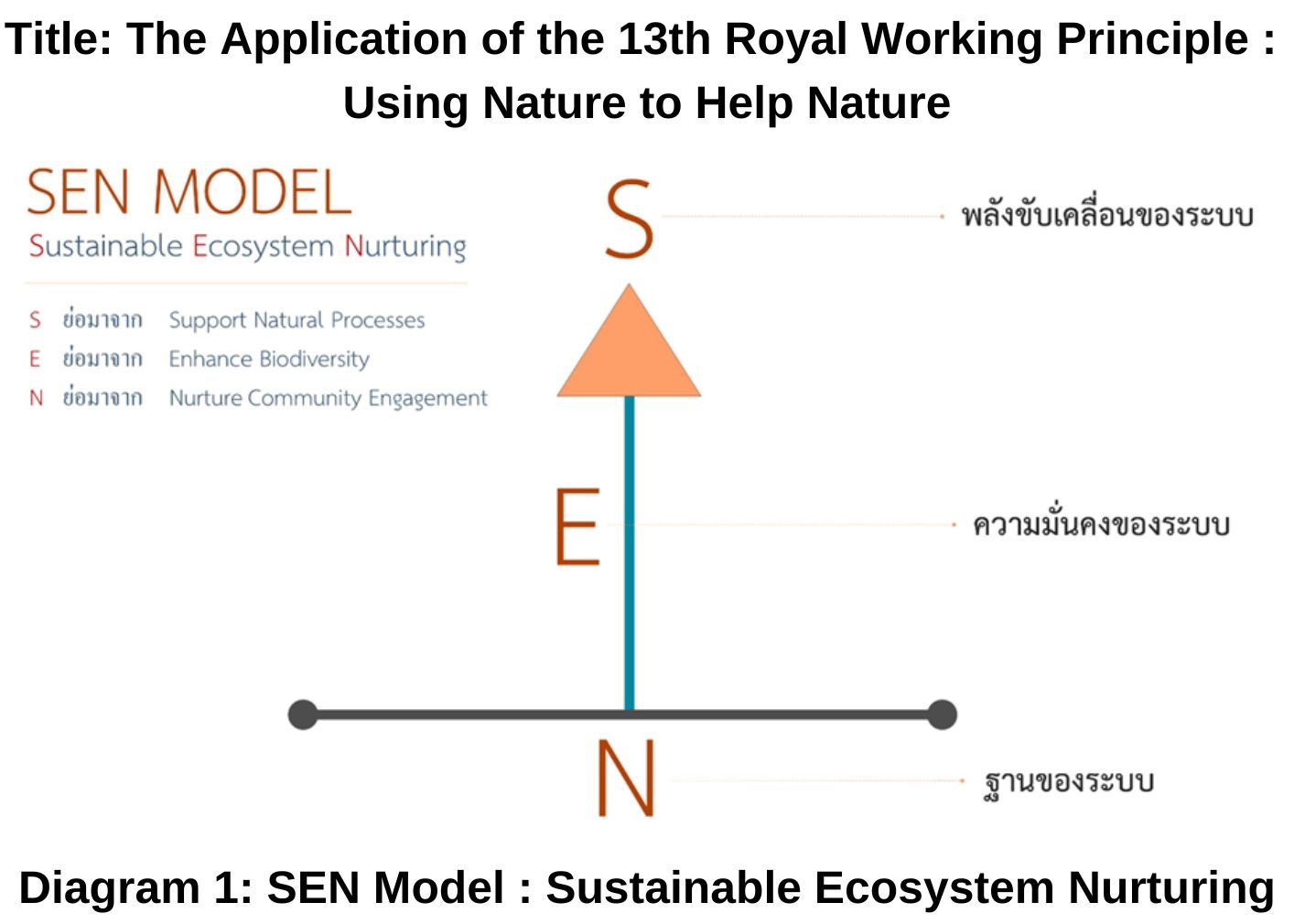The Application of the 13th Royal Working Principle : Using Nature to Help Nature
Keywords:
Application, the 13th royal working principle, Using Nature to Help NatureAbstract
The objective of this academic article was to study and analyze the application of the 13th Royal Working Principle: Using Nature to Help Nature, one of the 23 royal working principles utilized by His Majesty King Bhumibol Adulyadej The Great in national development. The findings revealed that this principle promoted ecological restoration through natural processes, reducing reliance on complex technology and avoiding long-term negative impacts caused by human intervention. Its application in various contexts enhanced biodiversity and mitigated the effects of climate change. This concept aligned with both Western and Eastern philosophies, such as Aristotle's teleology, Taoist principles, and Buddhist philosophy, which emphasized balance and interdependence between humans and nature. In organizational and community contexts, the principle improved quality of life, teamwork, and the sustainability of organizational culture by supporting task delegation based on individual strengths. It served as a valuable framework for sustainable development in environmental, social, economic, and managerial dimensions.
References
ทรงวิทย์ แก้วศรี และคณะ. (2562). ความสัมพันธ์ระหว่างปฏิจจสมุปบาทกับอริยสัจ 4. วารสาร มจร บาฬีศึกษาพุทธโฆสปริทรรศน์, 5(2), 35-45.
พระปลัดเมธีปิยธมฺโม (หินใหม่) และคณะ. (2563). การประยุกต์ใช้ปรัชญาหลังนวยุคและพุทธปรัชญา เพื่อการเผยแผ่หลักพุทธธรรมในสังคมยุคดิจิทัล. วารสารสังคมศาสตร์และมานุษยวิทยาเชิงพุทธ, 5(8), 451-469.
พระสาทิพย์ อนาลโย และคณะ. (2562). การวิเคราะห์ความสัมพันธ์ระหว่างปฏิจจสมุปบาทกับการบรรลุธรรม. วารสาร มจร พุทธปัญญาปริทรรศน์, 4(2), 225-236.
สำนักงานคณะกรรมการพิเศษเพื่อประสานงานโครงการอันเนื่องมาจากพระราชดำริ (สำนักงาน กปร.). (2559). หลักการทรงงานในพระบาทสมเด็จพระบรมชนกาธิเบศร มหาภูมิพลอดุลยเดชมหาราช บรมนาถบพิตร. พิมพ์ครั้งที่ 11. กรุงเทพฯ : สำนักงาน กปร.
เสฐียร ทั่งทองมะดัน และพระมหายุทธนา นรเชฏฺโฐ, ดร. (2562). ศึกษาปฏิจจสมุปบาทในพุทธปรัชญาเถรวาทกับแนวคิดแบบธรรมชาตินิยม. วารสาร มจร พุทธศาสตร์ปริทรรศน์, 3(1), 62-78.
Brindley, Erica. (2011). Moral autonomy and individual sources of authority in the analects. Journal of Chinese Philosophy, 38(2), 257-273.
Ch’u Ta-kao. (1976). Tao Te Ching. London : Unwin Paperback.
Chan Wing Tsit. (1994). A Source Book in Chinese Philosophy. Princeton : Princeton Englewood Cliffs : Prentice-Hall.
Comman, Jame W, Lehrer, Keith and Pappas, George S. (1982). Philosophical Problems And Argument : An Introduction. New York : Macmillan Pubishing Co., Inc.
Cronbach, L. J. (1990). Essentials of psychological testing. (5th ed.). New York: Harpercollins. Publishers.
Dokbua, F. (2006). All Chinese Philosophies. (3 rd ed.). Bangkok : Siam Publisher.
Fann, K.T. (2020). Reading Dao De Jing in English. Singapore : Partridge publishing.
Fung Yu-lan. (1976). The Spirit of Chinese Philosophy. Boston : Beacon Press.
Heidegger, Martin. (1976). "My Way to Phenomenology." In Martin Heidegger : An Illustrated Study. edited by Walter Biemel : Harcourt Brace Jovanovich.
Heidegger, Martin. (1988). The Basic Problems of Phenomenology. Translated by Albert Hofstadter. Indiana : Indiana University Press.
Heidegger, Martin. (2008). Being and Time. Translated by John Macquarrie and Edward Robinsoon. New York : HarperCollins.
Heidegger, Martin. (2011). "The Thinker as Poet." In Poetry, Language. Thought : Harper Collins.
Laozi. (2008). Tao Te Jing. translated by Ju Yanan. Boston : Harvard Square Publishing.
Lim, Tae-Seung. (2015). Signs of the Sacred : The Confucian Body and Symbolic Power. Philosophy East and West, 65(4), 1030-1051.
Moore, C.A. (1944). Philosophy : East and West. Princeton : Princeton University Press.
Olberding, Amy. (2016). Etiquette : A Confucian Contribution to Moral Philosophy. Ethics, 126(2), 422-446.
Stace, W.T. (1965). A Critical History of Greek Philosophy. New York : Macmillan.
Xinzhong, Yao. (2012). Introduction : Conceptualizing virtues in the analects of Confucius. Journal of Chinese Philosophy, 39(1), 3-7.

Downloads
Published
How to Cite
Issue
Section
License
Copyright (c) 2025 Institute of Sufficiency Journal

This work is licensed under a Creative Commons Attribution-NonCommercial-NoDerivatives 4.0 International License.



